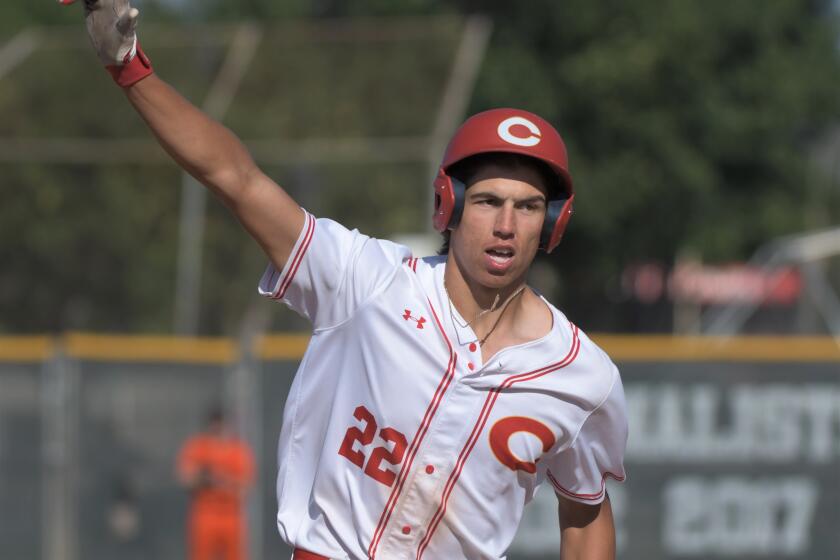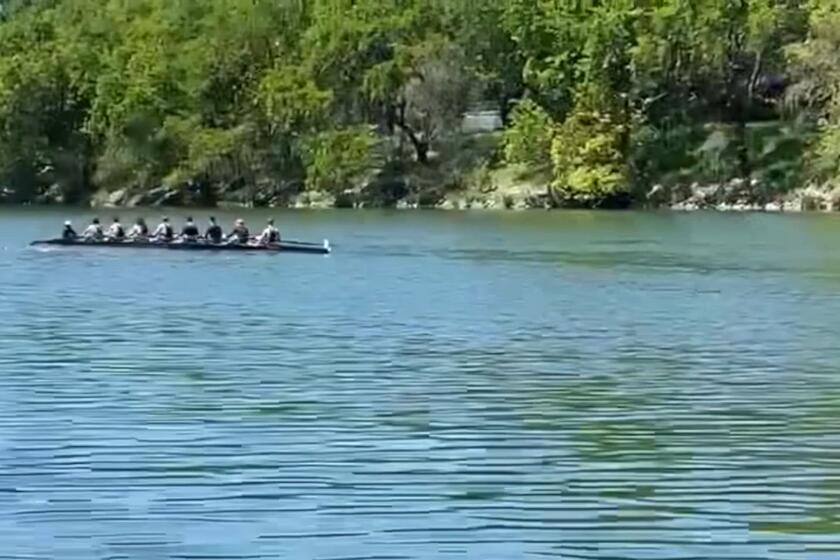Golden West’s Boland Had Heart to Return From Baffling Ailment
Ever since Julie Boland began playing volleyball at Ygnacio Valley High School in northern California, her biggest asset always has been her determination. Everything she accomplished in her sport came through a considerable amount of hard work.
And had it not been for that inherent quality, it is very likely that Boland’s playing career would have ended two years ago.
During the summer of 1983, just before beginning her freshman season at Golden West College, she had recurring instances of dizziness and fainting.
Initially, her doctors told her not to worry. But after her second day of practice that September, she experienced another dizzy spell, and went to her doctor. After her pulse was taken, it was discovered that her heart rate had dropped to only 27 beats per minute. She was immediately taken to a hospital.
Over the next several weeks, she remained in the intensive care unit, where doctors ran tests, which revealed nothing unusual.
Soon after, she was placed on a heart machine for a month, and closely monitored. Still, the cause of her ailment baffled every physician who examined her.
However, after nearly four months in the hospital, Boland began to show remarkable improvement. So, in January of 1984, she was allowed to return home.
Since then, Boland has fully regained her health, and hasn’t experienced even the slightest recurrence of her malady. And not only has she returned to her favorite sport, but she has become an accomplished player.
During the 1984 season, she was the Rustlers’ leading setter, who won the State Championship with a 20-1 record. She also was named to the all-South Coast Conference and all-state teams, the only freshman to earn those honors. This year, she is the leader on another outstanding Golden West team.
It never was determined exactly what the cause of Boland’s ailment was. She said the doctors told her it may have been some sort of virus, but they aren’t sure.
“Nobody really knows,” Boland said. “I just know (the dizziness and fainting) slowly quit happening . . . Now, they (the doctors) tell me to take my pulse after every practice, but other than that, I’m fine.”
Obviously, the road back wasn’t an easy one. For an ambitious person such as Boland, however, the most difficult part was the time she spent in bed.
“They told me to stay in bed and rest the whole season,” she said. “But after a couple of weeks, I couldn’t stand it anymore. I wanted to go out and run . . .
“I remember the first time I went out to run, I couldn’t even run down the block. It took another month to even run a mile. It took the whole (spring) semester to get myself back into shape.”
Albert Gasperian, Golden West coach, was impressed with how rapidly she returned to form.
“For not doing anything for five or six months, that took a whole lot of effort on her part,” he said. “For her to come back like she did to get in shape, and to play as well as she did, is really tough. Usually, after you lay off for a year, your confidence goes a little bit.”
Boland, however, has a history of working to achieve goals not expected of her. As a junior in high school, she was the leading player on her team. But Ygnacio Valley didn’t have a very advanced athletic program, so Boland realized that the only way to fully develop her potential would be to seek better coaching.
“My high school coach didn’t know anything,” Boland said. “I mean, my high school was really hideous. They didn’t know how to rotate or anything.”
So, she tried out for a girls’ volleyball organization called the Bay Club in the area which was run by two of the finest coaches in the country--John Dunning and Dave DeGroot. Dunning coaches at the University of the Pacific, one of the NCAA’s best teams; and DeGroot, a skilled setter, coaches the successful program at the University of Hawaii.
“I was a friend of Dave and Angie DeGroot,” Boland said. “And I used to watch them play on TV, and I thought they were the greatest. And I had heard John was really good, too. So I thought, I just had to make that team.”
She was cut from the club as a junior, but she was determined to make it as a senior. She had been told several times that she didn’t have the right kind of body to play volleyball--at 5-feet 7-inches, she was just too short.
But the discouragement only made her to push harder. She improved considerably by the next year, and made the team. There, she developed her as a setter, and became one of the best in the area.
“Julie is a different kind of player,” Dunning said. “She has a lot of desire. She has really had to work hard to succeed. Her biggest asset is that she’s a very smart player. She has a good court sense, she is a real good setter, and is capable of doing a lot of things to help her team . . .
“Most players spend time working out at school, and that’s it. But she was always at it. We used to practice three days a week, and for most of the kids, that’s all they would do. But she’d go out and play the other four days of the week.”
Following her senior year, Boland expected to receive several scholarship offers. However, just before the junior nationals, which college scouts from throughout the country annually attend, she sprained her ankle and was unable to play.
However, Cal State Long Beach had showed some interest, so she decided to move south. But after she found out more about the school and the volleyball program, she chose not to attend, and ended up at Golden West.
And since then, she has surprised nearly everyone with what she has accomplished.
“I didn’t know she was going to be that good, because she doesn’t have the ideal volleyball body,” Dunning said. “I thought she could be good, but I wouldn’t have expected her to be one of the best junior college players in the state. I mean, she was not one of the best high school players in the state.”
Boland even doubted that she could ever become as good as she has.
“I always thought I could be good,” she said. “But there’s the other part of me that thought, ‘You’re not as tall as everyone else and everything.’ Other players would know before a tournament started that they’d be MVP and all that, but I didn’t expect that.”
As determined as Boland has been, she admitted that following her ailment, she was forced to push herself harder than ever. In fact, she says that she isn’t sure whether or not she could have achieved what she did last season had she not been working extraordinarily hard to come back from her sickness.
“Any time you’re out a long time being out of shape, you have to work twice as hard,” she said. “I missed a lot. My other friends were so much further along. So, yeah, I had to work that much more.”
As another result, Boland has, for the first time this season, developed into a team leader.
“That was the one thing I felt she had to work harder on--to be more vocal,” Gasperian said. “She had to learn to direct. She’s pretty quiet by nature. And I think she’s really improved on that.”
Boland admits that she still is uncomfortable in the role.
“I’m not comfortable telling people what to do,” she said. “I do, because Albert expects me to do that, but it doesn’t come naturally.”
Although Boland appears to be well on her way to a second all-state season, she isn’t expected to play beyond the college level.
“She should be able to go on and play (at a four-year college),” Dunning said. “A setter is certainly a commodity that is in demand. And given her determination, I’m sure that she can.”
But he doubts she can ever play on the national level. In fact, he doesn’t believe that she could even start for him at UOP.
“That wouldn’t be fair (to offer Boland a spot on Pacific’s squad),” he said. “I have sophomore and freshman setters who are potential all-Americans. But I’m sure there are other people out there who would want good setters.”
Gasperian voiced a similar opinion on the matter.
“I think she’ll go to a top Division I school, and do very well, but she’s too small to go national,” Gasperian said.
But it seems wise not to hastily assume what Julie Boland’s limitations are. Very few individuals would be able to go from the intensive care unit to the all-state team in the same year.
Get our high school sports newsletter
Prep Rally is devoted to the SoCal high school sports experience, bringing you scores, stories and a behind-the-scenes look at what makes prep sports so popular.
You may occasionally receive promotional content from the Los Angeles Times.



